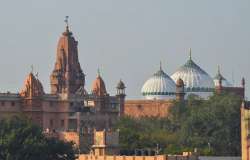Krishna Janmabhoomi case: Hindu side tells HC, Waqf Board, mosque panel failed to provide property documents
While the Muslim side argues that the 1968 compromise can not be challenged due to the expiry of three year time period to do so. Hindu side argued that the compromise was made by Sri Krishna Janmasthan Seva Sansthan, which was not empowered to enter into any such pact.

In a latest development in the Krishna Janmabhoomi-Shahi Idgah case, the Hindu side on Thursday told the Allahabad High Court that no documents regarding ownership of the property in dispute has been provided till date, either by the mosque committee or by the Sunny Central Waqf Board.
The submissions were made during the hearing of a plea moved by the Muslim side which challenged the suit seeking "removal" of the Shahi Idgah mosque adjacent to the Krishna Janmabhoomi temple in Mathura. High Court Justice Mayank Kumar Jain, who is hearing the case, has fixed May 20 for further hearing in the case.
The counsel representing the Hindu side also submitted that even there is no electricity connection in Waqf Board and mosque committee name and that they are "illegally" using electricity. The counsel informed the court that an FIR has also been lodged against them by the electricity department.
Hindu side on 1968 compromise
Yesterday, the Hindu side argued that the claimed compromise made in 1968 between the two sides was a "fraud" by the mosque committee and the Sunni Central Waqf Board. The Hindu side had submitted that the property belongs to deity Katra Keshav Deo for over 1,000 years. They also stated that a "chabutara" (platform) was constructed after demolishing the birthplace of Lord Krishna in the 16th century.
Muslim side's argument
Appearing from the Muslim side through video conferencing, Advocate Taslima Aziz Ahmadi, again told the court on Wednesday that the suit is barred by limitation. According to her, the two parties had entered into a "compromise" on October 12, 1968 and the said compromise was confirmed in a civil suit decided in 1974.
Ahmadi argued that a compromise can only be challenged under three years, but the present suit has been filed in 2020 and thus it is barred by limitation. She further submitted that the suit has been filed for possession after removal of the structure of Shahi Idgah as well as for restoration of a temple.
'Sri Krishna Janmasthan Seva Sansthan not a party'
Earlier, the Hindu side argued that the suit is maintainable and the plea regarding non-maintainability can only be decided after leading evidence. The application moved by the Muslim side under Order 7 Rule 11 of CPC raising question on maintainability of the suit is liable to be rejected, said the Hindu side.
The Hindu side counsel had further submitted that in both the claimed compromise in 1968 and court decree passed in 1974, the deity was not a party. According to the counsel for the Hindu side, compromise was made by Sri Krishna Janmasthan Seva Sansthan, which was not empowered to enter into any such pact.
(With PTI Inputs)
ALSO READ | Krishna Janmabhoomi case: SC extends stay on Shahi Idgah Mosque inspection order until August
